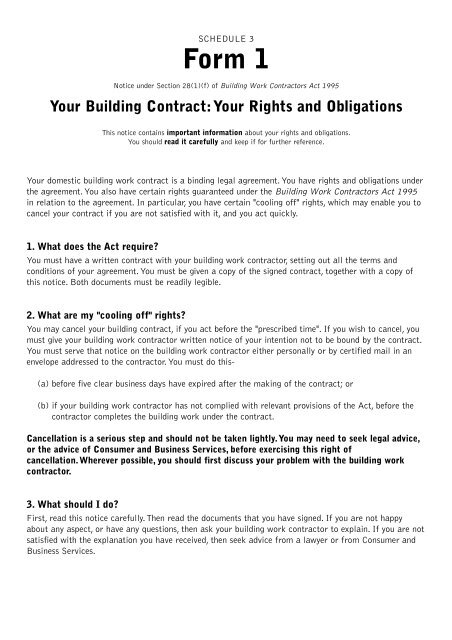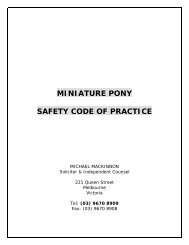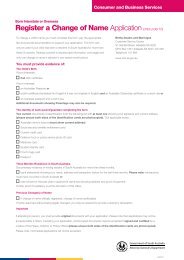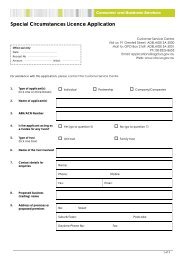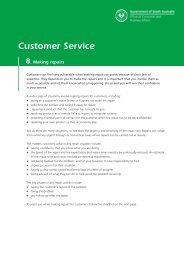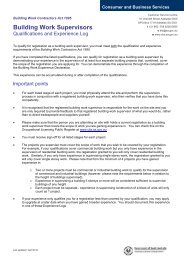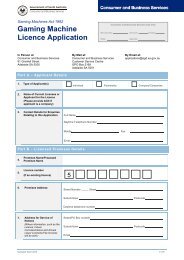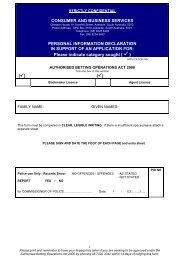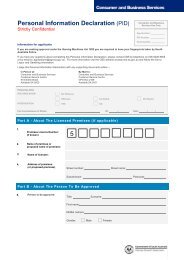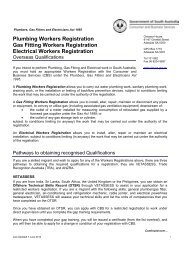Form 1
form 1.qxd - Consumer and Business Services
form 1.qxd - Consumer and Business Services
You also want an ePaper? Increase the reach of your titles
YUMPU automatically turns print PDFs into web optimized ePapers that Google loves.
SCHEDULE 3<strong>Form</strong> 1Notice under Section 28(1)(f) of Building Work Contractors Act 1995Your Building Contract:Your Rights and ObligationsThis notice contains important information about your rights and obligations.You should read it carefully and keep if for further reference.Your domestic building work contract is a binding legal agreement. You have rights and obligations underthe agreement. You also have certain rights guaranteed under the Building Work Contractors Act 1995in relation to the agreement. In particular, you have certain "cooling off" rights, which may enable you tocancel your contract if you are not satisfied with it, and you act quickly.1. What does the Act require?You must have a written contract with your building work contractor, setting out all the terms andconditions of your agreement. You must be given a copy of the signed contract, together with a copy ofthis notice. Both documents must be readily legible.2. What are my "cooling off" rights?You may cancel your building contract, if you act before the "prescribed time". If you wish to cancel, youmust give your building work contractor written notice of your intention not to be bound by the contract.You must serve that notice on the building work contractor either personally or by certified mail in anenvelope addressed to the contractor. You must do this-(a) before five clear business days have expired after the making of the contract; or(b) if your building work contractor has not complied with relevant provisions of the Act, before thecontractor completes the building work under the contract.Cancellation is a serious step and should not be taken lightly.You may need to seek legal advice,or the advice of Consumer and Business Services, before exercising this right ofcancellation.Wherever possible, you should first discuss your problem with the building workcontractor.3. What should I do?First, read this notice carefully.Then read the documents that you have signed. If you are not happyabout any aspect, or have any questions, then ask your building work contractor to explain. If you are notsatisfied with the explanation you have received, then seek advice from a lawyer or from Consumer andBusiness Services.
4. Is there anything I should look for in particular?Most importantly, check to see that the work you want your building work contractor to do has been fullyand accurately set out in the contract (including the plans and specifications). Do not rely on verbalpromises or agreement. If you want to change the work to be done at a later stage, you will have to reachagreement with your building work contractor, and your contractor will usually be entitled to make aseparate, additional charge as a variation to your contract. Not checking now could be very expensive.5. What about the price I have been quoted? Can it change?Some building contracts provide for a "fixed price". Others include a "rise and fall" clause. If yourcontract includes a rise and fall clause, then the price you have been quoted (even if it is referred to inyour contract) will most probably NOT be the total amount you will have to pay. Your contract price canalso change due to any variations to the building work in accordance with your contract.Note: Most variations require your written approval in advance, but others may be unforeseen. You shouldrefer to your particular contract. Certain items in your contract may be designated "prime cost" or"provisional sums", which may also lead to a change in the total sum you can be charged.If your contract includes a rise and fall clause, or other provisions as a result of which a price set out inyour contract may change, or is an estimate only, then the contract must contain "THIS PRICE MAYCHANGE" or "ESTIMATE ONLY" adjacent to the price subject to change. If there is more than one suchprice, then they must be set out in a single list in the contract.Those prices that are only estimates must be fair and reasonable estimates.6. What is a rise and fall clause?A rise and fall clause entitles your building work contractor to pass onto you increases (or reductions) inthe cost of performing your building work after you have signed your contract, whether those costs relateto labour (including relevant overhead) or materials.The formulae used in building contracts to determine the amount of the additional costs that can bepassed onto you vary. Check your contract carefully. If you have any questions, ask your building workcontractor to explain, or seek advice.7. What are "prime cost" items?Your building work contract may include the supply of certain goods and services, eg., kitchen stoves,bathroom tiling.These items may be designated "prime cost", so that if the standard of goods you selectis higher than that provided for by your building work contractor, then you may have to pay an additionalcost over and above that provided for, plus a surcharge, which may be up to 15 per cent of the cost of theitem.8. What are "provisional sums"?These are amounts your building work contractor has determined as "best estimates" of the cost of doingcertain building work under your contract. For example, if your building site slopes and no contour surveyhas been carried out, your building work contractor may not be able to prepare a final price for theearthworks needed to provide a level site for your domestic building work.The building work contractormay include an estimated figure which is subject to change when a survey plan is provided.Thatestimated figure is a "provisional sum".Provisional sums must be fair and reasonable estimates in the circumstances in which they are provided.
9. Are there any special problems with package land and building deals?Yes. If you have entered into a package deal for land and building work, then it is likely you have signed anumber of documents.The information contained in this notice relates only to the domestic building workcontract you have signed. It does not apply to your contract for the purchase of land, which is subject todifferent rules. You probably have less time to consider those documents than your building contract.Be particularly careful about package deals where your building work contractor is unable to start workimmediately because necessary approvals have not been granted, or services connected, or legal titlesgranted. Your building work contractor may be entitled to make additional charges arising from delayswhich are the fault of neither yourself or the contractor. If in doubt, talk to your building work contractoror seek advice.10. What other rights do I have?The Act implies certain warranties on the part of your building work contractor, and these applyregardless of what your contract says.These warranties are as follows:(a) your building work must be performed in a proper manner to accepted trade standards and inaccordance with the agreed plans and specifications; and(b) the materials supplied by the building work contractor will be good and proper materials; and(c the building work will be performed in accordance with all statutory requirements; and(d) unless the contract stipulates a period within which the work must be completed, the work will beperformed with reasonable diligence; and(e) if your contract is for the construction of a house, the house will be reasonably fit for humanhabitation; and(f) if you have made known to your building work contractor the purpose for which the work isrequired, or the result you want to achieve in a way that demonstrates that you are relying onyour contractor's skill and judgment, then your contractor warrants that the work and thematerials will be fit for your purposes, or of a nature and quality that they might reasonably beexpected to achieve that result.If your building work contractor does work or provides materials which do not comply with thosewarranties, then your rights have been infringed, and you may have a right to take legal action before thecourts. If you are not satisfied, talk to your building work contractor. If you are still not satisfied, seekadvice from a lawyer or Consumer and Business Services.11. What about Building Indemnity Insurance?Your building work contractor must take out a policy of building indemnity insurance before workcommences.The insurance protects you from some of the losses you may suffer if your building workcontractor dies, disappears or becomes insolvent. Your building work contractor must provide you with acopy of the certificate of insurance. Keep it for your protection.Important Note: From 1 September 2002, building work contractors will not be required to take out apolicy of building indemnity insurance in respect of contracts for the construction of multi-storeyresidential buildings.
(A multi-storey residential building is a building that has a rise in storeys of more than three andcontains two or more seperate dwellings. A storey does not include a mezzanine or a space within abuilding if it is intended that the space contain only a lift shaft, stairway, meter room, laundry, bathroom,shower room, water closet, car park or combination of any of the above.)12. Am I obliged to pay a deposit in advance of work done?As a general rule, your building work contractor is entitled only to genuine progress payments for workdone. Your building work contractor may ask you to pay in advance for money that has to be paid to athird party (eg: a council for planning approval, building indemnity insurance or to an engineer orsurveyor for a report). Apart from money in advance for such fees, the law prohibits the taking of anydeposit on a domestic building work contract in excess of $1,000 for contracts between $12,000 and$20,000, or 5% of the contract price for contracts $20,000 or more. If in doubt, seek advice before makingany payments.13. When should I make a progress payment?The law requires that your building work contractor make a written demand for a progress payment, sopayment should not be made without such a demand. Progress payments should not be made in advanceof the performance of the building work to which the demand relates. If you have borrowed money from arecognised lending institution, it is likely to make progress payments on your behalf.14. What if I have a dispute with my building work contractor?First, talk to your building work contractor. Many potentially serious disputes can be avoided by goodcommunication between building owner and contractor. Your contract may have clauses relevant todispute resolution which may assist both parties in resolving the dispute.If that does not work, you may need independent advice. You may wish to seek legal advice, or the adviceof Consumer and Business Services. Some disputes can be resolved by negotiation. Others canonly be resolved by legal proceedings, whether before the courts or by private arbitration as provided inmany building contracts.Before commencing any legal action over building work, you should seek advice from a lawyer or fromConsumer and Business Services.15. Where should I go for advice?First, talk to your building work contractor. If you want or need independent advice about your buildingwork contract, talk to a lawyer or Consumer and Business Services. A list of lawyers appearsin the telephone directory under the heading of "Solicitors".


